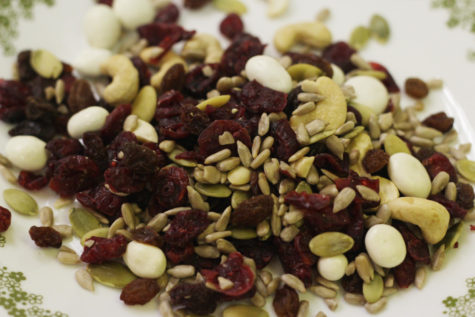Kitchen must haves
August 4, 2014
Coming to college means a lot of adjustments — being away from home, taking care of yourself, being on the go, having a different schedule each day — all of which affect our eating habits.
As young, independent college students, we are shaping the eating habits that we will have for the rest of our lives, but it comes at a time when many of us have trouble cooking or making healthy food choices. Here are some tips on the foods and utensils you should always have in the kitchen or living space to make easy, healthy food choices.
Most of us know we need lots of fruits and veggies, we shouldn’t eat until we are full and so on, but how can we gauge whether we are eating the right amounts of food?
MyPlate, the Department of Agriculture’s food recommendation system, advises that half of our plate should be filled with fruits and vegetables. The majority of our grains, which should be a quarter of our plate, should be whole grain and our protein sources, the last quarter, should be lean. Our plate should be colorful and we should have variety in our diet.
Even knowing all of this, how are college students supposed to make healthy choices when they are always on the go and there are tastier options like brownies and pizza?
Amy Clark, a dietitian at Hy-Vee, said, “Getting to college and having unlimited choices and limited cooking experience can make a diet of fast food, chips, soft drinks and pizza commonplace. Several weeks of this can lead to quick weight gain.”
No one expects college students to eat only healthy food, but there are certain foods and utensils that will enable students to be healthy eaters, even with a college lifestyle.
Lisa Nolting, an ISU Dining dietitian, said that we should have nutritious food that requires little preparation on hand. Nolting helps students with allergies or a health issue create meal plans specific to their needs and also does one-on-one nutrition counseling. Students wanting to know more about the foods they should be eating can also contact Amy Clark at Hy-Vee. For a few of their recommendations on specific food choices, see Table 1.
Nolting and Clark also recommended that students have certain utensils that make food preparation easier. For dorms, students should have a small microwave, minifridge, cutting board, strainer, plates, measuring utensils and silverware.
In addition to those utensils, students living in apartments should have pots, pans, a slow cooker and a blender. It’s also a good idea to have containers for storing food or taking it to class with you. Table 2 lists price ranges for these items.
Students living in dorms typically have meal plans but need to keep in mind that they should have other healthy food options on hand in their room. Students in apartments often don’t eat a lot of their meals through ISU Dining, so it is important for them to have the means to make a healthy meal.
Make time to go grocery shopping, plan what meals you will have and plan when you can prepare the meals. If you have a roommate or roommates, coordinate the plans with them.
You can put food in a slow cooker to cook all day while you are in class or blend up some fruits for a smoothie to take on the go. You can cook bigger portions and freeze or refrigerate part of it for later. Make sure you always have healthy, tasty meals in your kitchen so that it makes it harder to make an unhealthy food choice.
Nolting says that our diet isn’t shaped by one decision, but the multitude of decisions that make up our eating pattern.
“All foods fit into a balanced diet,” Nolting said. However, she acknowledged that students should have limited amounts of fat, sugar and sodium. Furthermore, caffeine consumption should be limited, especially in the afternoon and evening. Alcoholic beverages also contain a lot of empty calories.
The key to healthy eating in college is not only to have the right foods and utensils, but also to take time to plan your choices.
Don’t go too long without food — bring snacks with you so that you will be able to keep replenishing your energy. Don’t sleep so late that you can’t have breakfast before class. Don’t eat junk food while studying or watching movies because it’s easy to overindulge when you are focused on something else. If you have something unhealthy, make sure you also eat something healthy. Eat slowly so you know when you are full. Be conscious of what you eat and how you eat it.
“To keep energy levels heightened throughout the day, it’s recommended to refuel every four hours,” Clark said.















